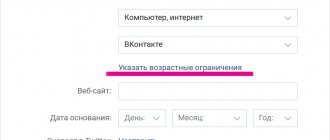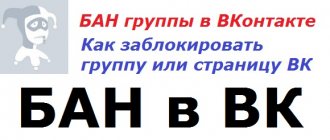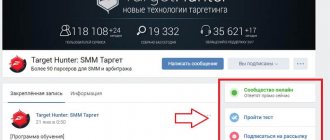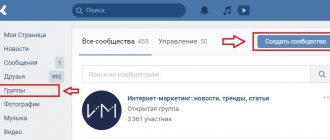OOS – especially dangerous situations
Oh, how wrong is the one who considers the Internet and SMM to be a frivolous matter: “Just think, a group, some kind of kindergarten! What could happen there? Yes, a lot of things. And the consequences can hit your business.
You may be accused of lying, deception, or incompetence. And it is completely groundless. It will just seem to someone that your products or services are not good enough, and that your employees are boors and bastards. Then go prove that you are not a camel. In the meantime, you prove it - the clock is ticking, people read and draw their own conclusions. And even if you prove it, maybe as in the joke: “either he stole it, or it was stolen from him, but a residue remains.”
They may write prohibited content on your wall . For example, a video or meme that incites ethnic hatred, calls for extremism and other anarchy. And if you didn’t see it/missed it/left it unnoticed, pray that no one notices. You can, of course, choose the ostrich policy and give up: oh, let them write what they want. But if something happens, both the author of the comment (or post) and you, amigo, will respond. We have already written about how you can get caught in an article for making a joke on social networks. Ok, maybe not to jail, but blocking a page is also not a pleasant event.
Yes, you can be blocked . We have already written about the reasons for blocking the VKontakte group. If you’ve gained more subscribers, radically changed your topic, or placed too many third-party advertisements – congratulations, you have a bomb in your hands that can explode at any moment. If you sell prohibited goods - wow, let's move away, it will soon be hot. The shock wave can hit your entire business - especially if some of your customers come from social networks.
You may be sued or complained to in the authorities . Information on the group wall is considered publicly available. If you write something like “We have the best brake pads” - hello, advertising law! You can’t write like that—save evaluative superlatives for personal conversations. Otherwise, a competitor or a dissatisfied client could take advantage of the situation.
Promotion of VKontakte: 75 tips for promoting a group
How to make a Facebook administrator
Promotion on Facebook is another integral part of the overall SMM strategy, and in some cases it is the main focus.
How to appoint an administrator in this social network:
a) By logging into your account on the website: www.facebook.com, log in to the profile of the current owner of the group or its administrator.
b) Go to your public page and go to the “Participants” tab.
In the list that appears, find the future administrator and click on the gear icon.
In the list that appears, select “assign as administrator.”
That's all! Another group administrator on the Facebook social network has been appointed. In order to demote any current leader, you need to do the opposite, that is, go to the list of group members and, by clicking on the gear, in front of the administrator, demote.
I would like to note an important fact: on Facebook there are no levels of access to editing information in the form of the roles of “Moderator” or “Editor”, as in Vkontakte. For this reason, by appointing a person as manager, you give him full powers to resolve absolutely all issues that in any way concern the group.
Moderator Code
- Don't answer rudely. The brand speaks with your messages, and if subscriber Kolya can write you an unfounded insult, then you can’t.
- From the first point you should not conclude that you have to endure something. The administrator of the VKontakte community is the owner of the house. You can remove uninvited guests from your home and ban them forever.
- Don't be afraid of controversial topics. This is the basis for creating a community within a community. Just pay special attention to the moderation of these posts. Do not let participants move from the subject of discussion to personalities.
- Do not be silent. Nobody likes talking into the void; it’s the same as talking to a wall. So don't expect heated discussions if you remain silent like Nemo the fish and ignore your followers.
- Prepare templates for frequently asked questions. Even if the answers to them are in the pinned topic, believe me, no one reads them. Why search and strain when you can send private messages/comments? Questions of price, delivery, how to get there, what it’s made of, and is there a certificate. Remember all the questions that you were asked more than 2 times and make a detailed guide on them.
- If the answer to a question is not in your magical template folder, don’t rush to panic and bury your head in the sand. Write to your interlocutor that you will clarify the question with a specialist and add how long it will take for you to return with an answer. Specifics are your best friend. It’s better to take time to spare than feed them empty promises.
- Be human! Seriously, don't turn into a bot that responds from a script. It is especially dangerous to respond in such a scenario to a negatively inclined client, then the administrator of the VK group risks hearing the strongest curses addressed to himself, the company and the product.
Being an administrator of the VKontakte community means always being in the mood to help, support the conversation and reassure the offended. You become a reflection of your brand and the better you build relationships with your subscribers, the warmer their love for your business will be.
And if you are not yet ready to take a risk and take over the administration yourself, then write to our manager. She will help you find the ideal moderator for you.
Instructions: new types of powers in communities
At the end of February, the developers changed the functionality for managing public pages and brought it as close as possible to managing groups.
In all communities, a unified system of authority for leaders was established, which includes three levels: moderator, editor and administrator . Below we will consider in detail the rights of each of them. Before registering users as leaders of your community, carefully read the instructions below to avoid problems associated with violating user rights and even hijacking your community.
Moderator powers
The moderator has the least rights of all levels of management. Its direct purpose is to maintain order. Moderator rights can be grouped into three groups:
1. Rights to delete comments and posts in discussions
- The moderator can: Delete all comments of a specific user for the last week.
- Delete user-created discussion topics.
- Delete comments on behalf of the community.
2. Rights to remove photo/video/audio content
- The moderator can: Delete all photos, videos and audio recordings of a specific user published by him in the community over the past week.
- Delete photos/videos/audios added by other managers.
3. Rights to blacklist and invite new members
- The moderator can: Invite and approve new participants.
- Blacklist and remove members from the community.
- Remove members from the blacklist.
- Blacklist and remove more than 100 members per day from the community.
Editor's rights
In addition to all the rights of a moderator, the rights of an editor also include powers to manage content, design a community, and work with a wall.
1. Rights to the external design of the community:
- Full right to manage the community avatar and edit the status.
- View and edit community wiki pages protected by privacy settings.
- Pinning community posts.
2. Rights to publish and manage content:
- Upload, edit and delete community photos and photo albums.
- Full control over community audio and video recordings.
- Work with documents.
- Manage topics in discussions and the ability to edit participant comments.
3. Rights to the wall:
- Create, edit and delete posts on behalf of the community.
- Working with suggested news.
In addition, editors have the right to view community statistics and change their privacy settings.
Administrator Rights
The administrator is the highest level in community management. He already has all the rights of a moderator and editor. Be extremely careful when assigning other users as administrators.
The administrator has the right:
- Appoint and remove community leaders.
- Edit all information about the community, including short address and name.
- Set up RSS and Twitter synchronization.
- Work with applications: add applications to the community and, conversely, specify the community as the official group of the application.
When assigning a manager, you can also choose whether to display him in the contacts block or not. You can read more about this function in our article New block Contacts in groups.
A few more changes in public management:
- It is now possible to remove members of public pages from the list of subscribers, which was previously implemented by adding the user to the blacklist.
- An instant search by subscribers has appeared, which only works in communities with more than 1000 members.
PS You can read about the most effective ways to promote your community here.
How do the difficult everyday life of VKontakte moderators go?
The profession of a VKontakte moderator has always been full of mysteries and surrounded by myths. These specialists are busy identifying and removing video, photo and text content prohibited by the rules of the social network.
It was not possible to find out the exact number of moderators, but, according to information posted on the “VKontakte with Authors” page, since 2010 their number has increased from 10 to several hundred.
The first moderators worked on pure enthusiasm and did not even receive a salary. People got into the team randomly - the management of the social network simply invited the most active users to cooperate.
© masterok.livejournal.com
Here's how a former moderation department employee describes the hiring process:
At the dawn of VKontakte there was such a thing - “name moderation”. It was important that people find each other by name, so name changes were checked for plausibility, a considerable percentage by hand. They paid for it with votes. A lot of moderator names were required, and some were chosen randomly from users who were in no way connected with the team and had no aspirations to get into it. Based on the activity on the site and the adequacy of the personal page. A person wakes up, goes to the page - and suddenly a button for moderating names appeared. A couple of them later became very good content moderators.
A little later, support agents appeared whose task was to respond to user complaints. These employees were already recruited in an organized manner, through the “Vacancies” section.
At the same time, moderators continued to be invited in a non-public manner, among people who know how the social network works, but were not suitable as agents due to their inability or unwillingness to communicate with people.
© masterok.livejournal.com
It also happened that support agents became disillusioned with their work and left to become moderators. This is a completely natural professional transformation - a person became fed up with communicating with users (and they are different) and took up a punishing sword.
Most often, social network users complain about pornography, spam, insults and advertising. There is a specialization among moderators - a separate group is responsible for combating shock content, child porn and simply violence. This is the most secretive department of moderators - their names and even what their department is called is information that is not publicly available. This approach protects employees from persecuting users who violate the rules of the social network.
Now you can become a VKontakte moderator using a special form, which contains only three questions: how is spam different from flooding, how is pornography different from erotica, and where is the line between intentional insult and emotional discussion. The requirements for applicants are extremely simple - no education or work experience is required - just have a VKontakte account.
© masterok.livejournal.com
Applicants who answer correctly the questions asked in the form take a special test. At this stage, applicants' ability to think analytically is tested, as well as their ability to process large amounts of information. Applicants for the position of moderator must live in Moscow or St. Petersburg, although the work is remote.
One of the current moderators, who gave his name as Oleg, said that representatives of his profession do not have a strict work schedule, but they still have to devote at least 8 hours a day to work. Moderator Sergei added that you can work “according to your mood,” but the issue of self-organization is always acute.
Moderators can also come to the VKontakte office, although there is no separate room for this group of employees. They can work in a shared coworking space, among support agents, spam analysts and other “freelance” specialists. Yes, this coworking space is not located in the Singer building on Nevsky Prospekt St. Petersburg, where the company’s central office is located.
© masterok.livejournal.com
Working from home attracts many applicants for moderator positions. Here's what one former employee of the social network, who did not want to give his name, says about this:
“Probably the main advantage of our work is that there is no office. Work is carried out from home. He opened his eyes and was already at work. You don’t even have to wash your face, no one will notice anyway. Just an introverted social phobia's dream."
Initially, the work of a moderator was assessed by the number of hours worked. Now everything is much simpler - the employer is interested in the amount of material processed per week. It also takes into account how quickly the moderator responds to user complaints.
All employees are divided into groups that periodically check each other’s work - this ensures impartiality. The work of an individual moderator can also be checked by his supervisor - sometimes even individual posts processed by an employee are selectively reviewed.
© masterok.livejournal.com
The VKontakte page belonging to the moderator cannot be distinguished from the page of any other user. There is no indication on it that this person works for the company. When hired, employees also sign a non-disclosure agreement (NDA). Strict rules have been developed for those who work with user content, failure to comply with which can result in immediate dismissal.
The moderator is prohibited from disclosing user names or telling anyone what information has been deleted;
The NDA agreement prohibits showing outsiders the moderator’s desktop, the interface he uses, and also revealing methods for detecting prohibited content;
The employee must report for each deleted user post, ban, or response to a complaint in the moderation system.
The system saves information about the actions of moderators, devices from which the login occurred, as well as reports on the work done. If a manager doubts the correctness of his subordinate’s actions, he has every right to demand an explanation about a particular decision made.
In the early years of the social network’s existence, moderation was complex and time-consuming, as it was carried out entirely manually. Nowadays content processing is simplified and does not take much time. The program, developed by VKontakte specialists, selects suspicious content using a special algorithm and offers it to the moderator for review. All that remains is to make a decision, which is not always easy, and press one of the buttons: “Ban” or “Leave.”
© masterok.livejournal.com
Moderators talk about how they daily have to plunge to the very bottom of human vices. Thousands of videos with murders, fights, abuse of adults, children and animals pass before their eyes. This cannot but leave an imprint on the moderators’ perception of the world. Some were unable to have breakfast, having moderated a post with dismemberment in the morning after a month of work, while others, on the contrary, became completely insensitive to shock content after just a couple of days.
It should be noted that, unlike vulnerable Facebook moderators, our social network workers do not cry into their pillows at night, do not go to a psychologist and do not change their religious views. Several people admitted that, thanks to work, they began to limit themselves in smoking and drinking alcohol, and some reported that they had become more cynical.
All moderators say that when working with shocking content, they are helped out by dark humor, fresh memes and a sober view of the world around them. There are visits to psychologists, but they happen very infrequently. One of the former moderators said that, as someone who grew up in Russia in the 1990s, he could not be frightened by pictures from the Internet.
© masterok.livejournal.com
We can say that the guys and girls who moderate content for VKontakte are surprised by the suffering of their colleagues from Facebook and YouTube. In addition, they do not understand why these people, complaining of incredible suffering, do not leave work and continue to experience discomfort.
At the same time, one of the girl moderators said with a laugh that she herself and all her colleagues were somewhat “professionally deformed.” According to her, an ordinary person will be shocked by the discussions of necrophilia, dismemberment and other “delights” that reign in a special moderator chat.
Moderators receive a separate bonus for working with pornography and shock content, so they prefer not to complain about professional difficulties. Walking, reading books, sports, going to cinemas and concerts help many people get distracted. But there is not much time left for all this, because the moderator must be ready to respond to the complaint at any time, except for the days assigned to him as days off.
© masterok.livejournal.com
Moderators prefer not to answer questions about salary levels, although the employer’s rules say nothing about this. The journalists only managed to find out that the guys do not complain about pay and, in addition, they know that hard work will be rewarded with a bonus.
As it turns out, not all employees work for the social network for the money. Many people like their profession and are also attracted by the feeling of belonging to a world-famous social network that unites tens of millions of people.
Source
How to transfer owner rights?
This process is not quite complicated. In just a couple of clicks you will cope with this task. Below are step-by-step instructions:
- Go to "Community Management".
- Next, on the right, select the “Participants” section, and then the “Managers” subsection.
- You will see a list of all public leaders. Select the person you want and click the “Edit” button.
- In the window that appears, click the “Set as owner” button.
- Next, confirm your action.
After the actions taken, the owner's rights will be transferred. Remember that you will have 14 days to change your mind. After this time, there will be no opportunity to return the community.
If you still change your mind, then follow the instructions:
- In the site header, click on “Notifications”.
- Look for the notice that rights have been transferred (it will only be here for 14 days).
- Click the "Return Community" button.
- Confirm the action.
How much do they earn
Now we need to pay special attention to the earnings of moderators. In fact, I won’t give exact numbers, because there is no specific value here. Earnings can vary from 3 thousand rubles to several tens. It all depends on the site and the owner.
If the owner of a VK group or website does not have extra money, then he will not pay much even for such important work. Most likely, it will cost 5–6 thousand rubles, considering this sufficient.
If you type this vacancy into HeadHunter, you will immediately see dozens of vacancies with a wide variety of salaries and requirements. Moreover, not all of them will be remote. Some companies hire moderators on staff, believing that this way they will work more efficiently.
According to the figures, it turns out from 10 to 40 thousand rubles. Finding a higher salary is rare. Lower too, but there is also a “Not Specified” category. Typically, it is in this category that vacancies with excessively low wages are published so as not to frighten applicants.
You can also go to any website and check this information personally. Most likely, you will see numbers within the limits that I have outlined. You may find a vacancy with a higher salary. But most likely, some additional activities are provided there: content management, publishing or something else.
Also, eminent projects such as Yandex, Mail or even VKontakte (not a group, but the social network itself) may have higher salaries. In this case, the salary will indeed be increased, but there will also be more responsibilities. An ordinary person on the street is unlikely to cope.
And Yandex won’t hire anyone on its staff. Most likely, you will need experience in similar positions or an impressive portfolio that will demonstrate your competence.
Yandex moderators can work with search results, some statements or services like Yandex.Taxi, Yandex.Food, etc. They most often recruit for a specific location, and this is indicated in the ad. I have already come across various vacancies in Yandex many times.
The most accurate information was always indicated there: remote work or staffing, salary, service in which to work, and a detailed description of the process. Also, vacancies may include a questionnaire that the applicant will have to fill out. There is nothing complicated there, the algorithm is the same everywhere - education data, personal information (full name, age, place of residence), preferences, work experience, etc.
It's the same in other large companies. Based on all this, we can come to the conclusion that moderators earn money in different ways. In smaller places the salaries are corresponding. But in order to reach a decent level of earnings, you will have to acquire a resume, have some special knowledge and understand the essence of the work of a moderator specifically on the platform you want to get into.
Who is more important: moderator or administrator?
There is another important profession that is very important in promoting a website, forum or any other platform - administrator. The question immediately arises: who is more important, the moderator or the administrator? Now we will answer it.
First, we need to figure out who an administrator is. In most cases, this is the creator of the site, who monitors its functioning and maintains it. On sites and forums that are very popular and have a lot of traffic, responsibilities are distributed among several administrators. For example, responsibilities related to the smooth operation of the content management system are assigned to the technical administrator. Work with advertising and advertisers is assigned to the finance administrator.
The moderator, in turn, is an assistant to the administrator, whose responsibilities include monitoring compliance with the rules by users. Of course, depending on the CMS of the project, an SMM targetologist may also be appointed, but mostly they do without him.
Thus, the main difference between an administrator and a moderator is that they have different rights and levels in managing the Internet site. In addition, the administrator can appoint and dismiss a moderator.











